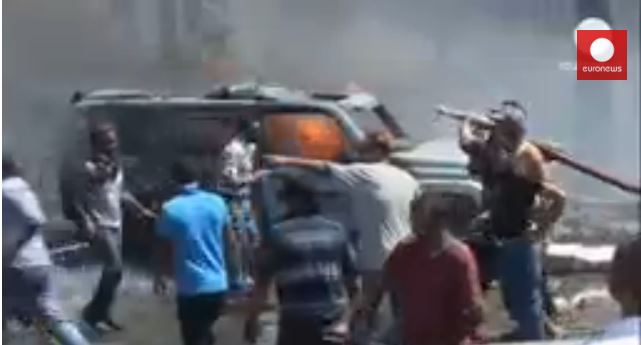 Men are trying to extinguish fires after the explosion in Tripoli. (Euronews)
Men are trying to extinguish fires after the explosion in Tripoli. (Euronews)
Estimation of the current situation in Lebanon – Part 2
Hezbollah, rebels or a third party?
The double car bombing in Tripoli might well be the work of Syrian rebels or their Lebanese sympathizers. Though, in Lebanon many national and international players have plenty of reasons on a daily base to go after on another.
We think, Hezbollah does not need to show its strength, and surely it is not served well with an angry Sunnite community at home, consequently playing into the hands of an alleged Sunnite militant strategy mentioned in the first part of this estimation.
Retaliation into no man´s land
The morning before the deadly car bombing in Tripoli, Israel did attack a target in Naameh, south of Beirut, with an retaliatory air strike. In the evening before, four rockets had been fired from Lebanon towards Israel without causing damage.
The target Israel hit is located in a region where the Palestinian PFLP-GC (Ahmed Gibril) group runs underground tunnels.The group is operating under the directions of the Syrian government and cooperates with Hezbollah. The damage caused by the air strike, by all public accounts available, was minimal.
Given the assumption that Hezbollah is busy enough in Syria and its cooperation with the PFLP-GC is well known, it is difficult to see why it would – as both, governments and non-governmental organisations, often do – use even a third hand to provoke Israel.
Cold war
A cold war is playing out since 2006 between Hezbollah and Israel. Although both regularly claim they were ready to go at any given moment, that´s mere rhetoric. Neither is willing to enter a real confrontation because they know, it would severely harm them both. Unnecessary provocations are being avoided or responded by fire into no man´s land.
The same is being exercised regularly after cross-border attacks between Israel and Syria. It is a well-established, face-keeping mechanism, agreed upon by all concerned players.
No challenger for Hezbollah at home
It seems to us, Hezbollah recently is the target of several attempts by a third party to implicate it in internal and external struggles in order to run its forces thin in Syria and pressure it to mount up defence back home.
But there is several flaws in that strategy. Even though people might get angry with Hezbollah in Lebanon, nobody can challenge it. Christians won´t be dragged into a Shiite-Sunnite strife, and Lebanese Sunnites – traditionally – lack the will and capacity of fighting on a larger scale
Sunnites’ lack of domestic military leader
Due to centuries-long Arab and Ottoman (Sunnite) rule over the country, Sunnites rarely had the need to protect themselves. They lived the luxury of being able to concentrate on business and trade.
Christians and Druze on the other hand developed a militant resilience. It originated in prosecution and hard life those sects had to live in mountainous regions that also gave them natural protection.
Veteran fighters of the civil war from 1975 to 1990 still recall, Lebanese Sunnite were no force to reckon with. They were divided, and instead of developing a united force on their own, the country´s Sunnites often employed Palestinian and various African mercenaries.
Christian and Druze militias instead fought some of the most ferocious battles among one another for contested territory and out of vengeance.
Rise of Hezbollah and Shiites
Shiites, as the former lowest social class, after the founding of Hezbollah rose up to being the dominating sect of the country.
Hezbollah, with the help of Iran and Syria, over the years did penetrate several state institutions – including government, intelligence and military – and since several years more or less directly controls the fate of the country.
One could well argue, Hezbollah has become in many ways the occupying force it once fought, namely Israel.
This is an estimation of the current situation in Lebanon and the region. It is based on assumptions that we see more likely playing out than others in the future. In the next part of our series we will take a look into Sunnite options, changing political discourses and emerging threats for Lebanon.
